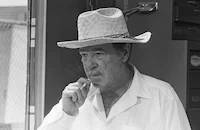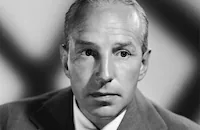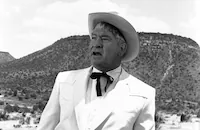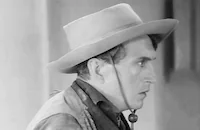Santiago

Brief Synopsis
Cast & Crew
Gordon Douglas
Alan Ladd
Rossana Podestà
Lloyd Nolan
Chill Wills
Paul Fix
Film Details
Technical Specs

Synopsis
In 1898, gunrunner Caleb "Cash" Adams and his men are ambushed by hijackers on the road to Tampa, Florida. Cash and his men fight off the attackers and continue the journey. In Tampa, Cash identifies himself to Lorenzo and Dominguez, two representatives of the Cuban rebels, and expects to be paid for the ammunition and weapons his men have brought. Instead, Cash is told that he must deliver the goods to Cuba, a journey that involves a dangerous voyage through a Spanish military blockade in the waters surrounding the island. The Cuban agents try appealing to Cash on moral grounds, hoping that their struggle for liberty will inspire him to complete the mission. Motivated only by money, Cash, who has no other market for the munitions, agrees to make the delivery, but doubles his price. Although they promise to pay his asking price, the agents suggest that Cash should believe in a cause other than himself. The "ship" the agents have acquired for the voyage is the sternwheel river boat Vicksburg , which is piloted by Southerners, Capt. "Sidewheel" Jones and his first officer Sam, Sidewheel's former slave who fought beside him during the Civil War. After learning that a second shipment of munitions has also been loaded, Cash discovers that it belongs to his rival, Clay Pike, whom he correctly guesses was behind the ambush. Also on board is Doña Isabella, the "Cuban Joan of Arc," a spiritual leader of her people who has been raising funds for their rebellion. After the boat sets off for Haiti, the first stop on a zig-zag route to evade the Spanish, Trasker, an ex-alcoholic who serves as Cash's right-hand man, takes tea with Isabella. He explains to her that Cash, a former Army captain and West Point graduate, had once been his superior officer. One day Trasker got drunk while on guard duty, allowing a captured Indian chief to escape, who then killed an officer. Because Cash refused to place the blame completely on Trasker, he was court-martialed along with Trasker. After their expulsion from the military, Trasker and Cash became mercenaries. Throughout the voyage, Pike, Cash and their respective underlings barely contain their animosity, which often erupts into fights. Jingo, one of Pike's men, tries to knife Cash, but Cash manages to overcome him. As the boat nears Haiti, locals announce their arrival by drumming a secret code. On shore, Pike and Cash are partially paid for their efforts and meet the writer and patriot Josef Marti, the "Apostle of the Cubans." Isabella reunites with her eight-year-old brother Juanito, who longs to fight for his people and is fascinated with Cash's "soldier ring," a West Point school ring embossed with the mottos "duty" and "honor." For the rest of their payment, the gunrunners must proceed to Cuba by boat and then by wagon to the village of Santiago, where Gen. Maceo awaits them. On the boat, at dinnertime, an uninvited Pike rudely tries to force his company on Isabella at the captain's table. Cash and Pike almost come to blows, but desist when sailors report spotting Spanish gunboats ahead. Fortunately for the Vicksburg passengers, the sky darkens, which allows them to pass unnoticed by the Spanish. Signal drums are again heard and Isabella reports that they warn of a Spanish detachment guarding the shore. After jumping overboard, Isabella, a fine swimmer who knows the shore well, leads Cash, Pike and others to a safe place, from which they launch an attack on the soldiers, incapacitating them so that Sidewheel can bring the Vicksburg safely to port. Later, back on the boat, Pike tries to force himself on Isabella, but Cash overhears and comes to her rescue. Cash ejects Pike, then kisses Isabella, who at first resists, but then accepts him. When the ship's cook suspects there is a stowaway aboard, Juanito, who sneaked aboard in Haiti, is discovered. Upon docking, Cash and Pike's men unload the cargo and, with Isabella, Juanito and her workers, board the wagons for the last leg of their journey. After sending his sailors away from the ship, Sidewheel gives last instructions to his sailors, bids goodbye to Isabella, saying how proud he has been to know her. Unable to pass through Spanish lines, Sidewheel and Sam set explosives onboard the ship and wait. When Spanish soldiers board to ask questions about their ship's mission, Sidewheel distracts them while Sam blows up the ship. The death of all aboard allows Cash, Trasker and Isabella to begin their journey without having their presence revealed to the Spanish. After traveling a great distance, the group reaches a mountain pass to find a newly built, heavily guarded blockhouse. As they strategize a plan to pass the enemy, Juanito is caught by two Spanish soldiers, who try to force him to talk by beating him. Cash and Trasker kill the soldiers and rescue Juanito, but the child later dies from his wounds. At night, after filling the back of a wagon with explosives and tying the dead soldiers upright on the seat, Cash and Pike lead it toward the entrance of the blockhouse. The guards allow the wagon to enter and, once inside the gates, it blows up. The caravan then passes through, but is chased by soldiers. While the rest of the caravan continues, Cash, Pike, Trasker and several other men hold back and ambush their pursuers. Later, near their destination, Isabella is met by Maceo's representatives, who report that the general has been attacked and robbed of the money he was going to pay them for the guns. Hearing this, Pike suggests that they sell their goods to the Spanish, but Cash, who has fallen in love with Isabella and taken up her cause, insists that all the munitions be delivered to Maceo. In a final confrontation, Cash kills Pike, allowing the caravan to continue to their rendezvous point with Maceo.

Director

Gordon Douglas
Cast

Alan Ladd
Rossana Podestà

Lloyd Nolan

Chill Wills

Paul Fix
L. Q. Jones

Frank De Kova
George J. Lewis

Royal Dano
Don Blackman
Francisco Ruiz
Clegg Hoyt
Ernest Sarracino
Natalie Masters
Willard Willingham
Russ Saunders
Edward Colmans
Rico Alaniz
Paul Brinegar
Baynes Barron
Stan Ustan
Alma Beltran
Gloria Rhoads
Nacho Galindo
Nesdon Booth
Edward Short
Carlos Rivero
Edward Coch
Frank Yaconelli
Pepe Hern
Alex Montoya
Tom Hernandez
Abel Franco
Dick Crockett
Harvey Parry
Joe Brooks
Henry Escalanti
Crew
Gordon Bau
Marjorie Best
David Buttolph
Edward Carrere
Stanley Jones
Alan Ladd Jr.
Gus Levene
Moss Mabry
Owen Marks
Martin Rackin
Martin Rackin
Edward Roden
Irva Mae Ross
Russ Saunders
John Seitz
John Twist
William Wallace

Film Details
Technical Specs

Articles
Santiago -
The tale begins near Tampa, where Cuban rebels are waiting for Cash and his fellow mercenaries to arrive with a shipment of weapons and ammunition. After fighting off hijackers in an action-packed opening, Cash and company make their delivery, only to learn that they won't get paid unless they take the goods all the way to Cuba, which means sneaking through a Spanish naval blockade along the way. Cash accepts the deal - for double the money - and loads his cargo onto a riverboat run by two Civil War veterans: the captain, Sidewheel Jones (Chill Wills), and first mate Sam (Don Blackman), a former slave. Nobody is allowed to carry weapons on board, which is a good thing, since a second gunrunner is transporting a consignment on the very same voyage, and he happens to be Cash's longtime enemy. His name is Clay Pike (Lloyd Nolan), and although he strikes an uneasy truce with Cash for their mutual benefit, it's clear that he can't be trusted very far.
Their journey takes them first to Haiti and finally to Cuba, where the last leg must be completed by wagon. Other participants include Doña Isabella (Rosana Podesta), hailed as the Cuban Joan of Arc for her courageous efforts on behalf of the rebels; Juanito (Francisco Ruiz), her brave eight-year-old brother; Cash's sidekick Trasker (Paul Fix), whose loyalty goes back to the time when they were booted out of the military together; and Pike's henchman Jingo (Frank DeKova), a treacherous and dangerous galoot. The celebrated Cuban poet, philosopher, and revolutionary patriot José Marti (Ernest Sarracino) also makes an appearance, although the real Marti had been dead and buried for three years by 1898, when this yarn takes place. We never see Antonio Maceo Grajeles, the high-ranking liberation fighter supposedly waiting for the munitions in the Cuban village of Santiago, but again, the actual Maceo died in battle near the end of 1896.
The historical blunders in Santiago were easily spotted and pointedly criticized by Cuban observers, and according to the entertainment trade paper Variety, a union of Cuban educators sent correct information to Warner Bros. via the American embassy, hoping to forestall such errors in the future. One hopes the studio took note, but anyone who knows Hollywood knows this was a very long shot. In any case, Americans didn't watch Santiago to learn about Cuban history, they watched it to see Alan Ladd swashbuckle his way through a fictionalized moment in Cuban history.
They got their wish. Ladd fights with his fists, shoots with his gun, kisses Isabella with his lips, soothes little Juanito at a tragic moment, and does a bit of swimming as a bonus. His effortless charm is equally on display; he looks swell in evening wear and shows off elegant table manners in one memorable scene, greatly amusing a bad guy who earns a swift comeuppance in return. Santiago was directed by Gordon Douglas, a trusty professional whose Ladd vehicles include The McConnell Story (1955), a Korean War drama made a year earlier, and The Big Land (1957), a western made a year later. His rapport with the star pays solid dividends. So does the casting, which bears out the underappreciated fact that savvy studios complement star personas with compatible supporting players. Here the most effective ones are Nolan, whose light hair and easy smile comport well with Ladd's pleasing demeanor, and Wills, whose extroverted acting is an excellent foil for Ladd's more understated style. They're every bit as enjoyable to watch as the luminary at the top of the bill.
To be more accurate about Hollywood history than Santiago is about Cuban history, though, it must be noted that Ladd's best days would be over before long. He had given his legendary performance in George Stevens's classic western Shane (1953) just three years previously, but the year of Santiago was also the year of Stevens's marvelous Giant, for which Ladd had declined the opportunity to play oilman Jett Rink, which became the last hurrah of James Dean's meteoric career. Generally weaker roles and struggles with lifelong psychological ills took an increasing toll on his star power as his death at age 50 approached.
Santiago doesn't rank with major Ladd achievements like Frank Tuttle's This Gun for Hire (1942), John Farrow's Two Years Before the Mast (1946), George Marshall's The Blue Dahlia (also 1946), and of course Shane, but it's a sturdier entertainment than you'd guess from the verdict of New York Times critic Bosley Crowther, who called it a "deranged adventure drama," making it sound more eccentric (and perhaps more interesting) than it really is. "We do not recommend this...picture for abstract philosophers," Crowther wrote in the friendlier conclusion of his review, "but for concrete social observers it has its moments of fun." With that judgment I cheerfully concur.
Director: Gordon Douglas
Producer: Martin Rackin
Screenplay: Martin Rackin and John Twist; from a novel by Martin Rackin
Cinematographer: John F. Seitz
Film Editor: Owen Marks
Art Director: Edward Carrere
Music: David Buttolph
With: Alan Ladd (Caleb "Cash" Adams), Rosana Podesta (Doña Isabella), Lloyd Nolan (Clay Pike), Chill Wills (Captain Sidewheel Jones), Paul Fix (Trasker), L.Q. Jones (Digger), Frank DeKova (Jingo), George J. Lewis (Pablo), Royal Dano (Lobo), Don Blackman (Sam), Francisco Ruiz (Juanito), Clegg Hoyt (Dutch), Ernest Sarracino (José Marti)
Color-92m.
by David Sterritt

Santiago -
Quotes
Trivia
Notes
After the opening credits, voice-over narration at the beginning of the film announces: "In 1898, the world was at peace with the exception of one troubled spot-Cuba, a reluctant colony of Spain smoldering with the flames of internal strife." The narrator goes on to discuss Cuba's struggle for liberty, which developed into open rebellion against the heavily armed Spanish soldiers, and the fact that outcasts and soldiers of fortune, who were "tempted by high profits and the spirit of adventure," gathered contraband weapons to sell to the Cubans at Tampa, FL. Although Warner Bros.' publicity establishes the time as "after the Civil War," the narrator sets the scene of the film as 1898.
Santiago marked the Hollywood debut of Italian actress Rossana Podestà, who was introduced earlier in the year to American audiences as "Helen" in the 1956 Warner Bros. production Helen of Troy, which was filmed entirely in Italy. Although her appearance in the film has not been confirmed, according to Hollywood Reporter news items, Tina Menard appeared in the film.
Although most American reviews were generally favorable, the New York Times review described Santiago as a "deranged adventure drama." According to an August 1956 Variety news item, many Cubans resented the film's portrayal of their patriots, Jose Julián Martí y Perez and Antonio Maceo y Grajales. The article noted that a Cuban historian, Herminio Portell Vila, wrote an article for the Cuban magazine Bohemia to point out the historical inaccuracies in the film. The Variety news item also reported that the Teachers Union of Cuba sent the U.S. ambassador biographies of Martí and Maceo, which he requested be forwarded to Warner Bros. "so that, in future films concerning Cuba, the studio will avoid committing so many inexactitudes, historical errors and events detrimental to our patriotic feelings." Maceo died in 1896, two years before the setting of the film, and the writer-patriot Martí, in 1895.

Miscellaneous Notes
Released in United States Summer July 1956
Released in United States Summer July 1956













